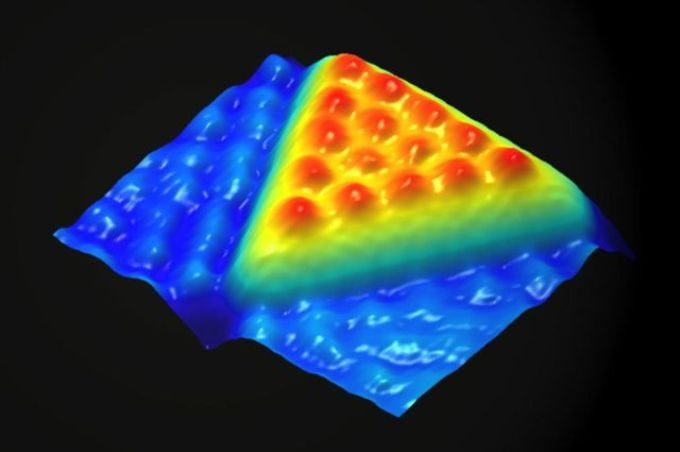Oct 27 2016
Nanoscience research includes molecules that are only 1/100th the size of cancer cells and these molecules have the ability to improve the quality of our lives and our health. Currently, nine leading nanoscientists foresee what we can expect in the future, and conclude that nanoscience is ready to make significant contributions in various areas, including electronics, health care, food, water and energy.
 Nanoscience will make major contributions in health care, energy and many other areas, researchers say. Credit: Charlie Sykes, Patrick Han and Paul Weiss/UCLA
Nanoscience will make major contributions in health care, energy and many other areas, researchers say. Credit: Charlie Sykes, Patrick Han and Paul Weiss/UCLA
Authors Dr. Andre Nel, chief of nanomedicine at the David Geffen School of Medicine at UCLA, and Paul Weiss, who holds a UC presidential chair and is a distinguished professor of chemistry and biochemistry at UCLA, report that there has been a significant progress made in nanomaterials.
In the ACS Nano journal, Nel, a distinguished professor of medicine, Weiss and their collaborators say the following:
- Nanoparticles can be devised to target infectious disease. These nanomaterials may target the lungs to deliver effective antibiotics and anti-inflammatory medicines and could combat viral and bacterial infections.
- The emerging immuno-oncology market is expected to produce advances that will trigger the body’s immune system to fight tumor cells. Key advantages of nanoparticles are that researchers can bind them selectively to receptors that are over-expressed on tumors, and they can be delivered to the same cell at a fixed dose and timing, even though significant scientific challenges remain.
- Nanoparticles may help produce more effective treatments for neurological disorders such as Alzheimer’s disease and Parkinson’s disease, as well as arthritis.
- Nanotechnology is expected to capture, change and store energy with better efficiency, and will help researchers safely produce efficient and sustainable large-scale energy production in order to meet the increasing demand for energy worldwide.
- Nanotechnology principles are being used for desalination and purification of water, and it is poised to make key contributions to supplying clean water worldwide.
- Technology is more likely to spread widely with the proliferation of “nano-enabled smart devices” in different areas such as information technology, consumer staples and telecommunications.
- The microelectronics market, currently valued at roughly $500 billion annually, has been producing products with nanoscale structures for decades. According to researchers, there is still room for major improvements, including numerous opportunities in creative design of devices for information storage and data processing.
- Advances in nanoscience may lead to reductions in food contamination and progress in food safety. Sensor technologies may be designed to use changes at the nanostructure surface so that they can easily detect disease-causing pathogens even before they spread.
The scientists discuss the requirement to safely employ new nanomaterials and give ideas for doing so. They also urge scientists to share their research with the public.
Nanoscience has brought engineers, clinicians and scientists together from many fields, and it will continue to cross several academic boundaries.
“The field is poised to make contributions far beyond the nanoscale worlds that we have explored so far,” said Weiss, who is also a distinguished professor of materials science and engineering at UCLA. “This is the age of discovery for nanoscience and nanotechnology.”
The scientists encourage strong national support for nanoscience, and foresee that key advancement toward major scientific goals will be attained by the end of this decade. They also encourage basic research to make discoveries that are currently unforeseen.